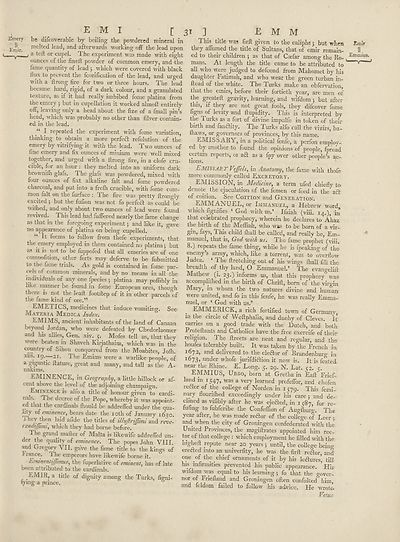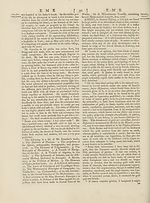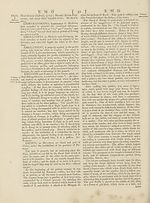Encyclopaedia Britannica, or, a Dictionary of arts, sciences, and miscellaneous literature : enlarged and improved. Illustrated with nearly six hundred engravings > Volume 8, ELE-FOR
(43) Page 31
Download files
Complete book:
Individual page:
Thumbnail gallery: Grid view | List view

E M 1 [ 31 ]
Emery be difcoverable by boiling the powdered mineral in
EMM
Emir me^ted kad, and afterwards working off the lead upon
y a teft or cupel. 'I'he experiment was made with eight
ounces of the fineft powder of common emery, and the
lame quantity of lead j which were covered with black
flux to prevent the fcorification of the lead, and urged
with a ftrong fire for two or three hours. The lead
became hard, rigid, of a dark colour, and a granulated
texture, as if it had really imbibed fome platina from
the emery } but in cupellation it worked almoft entirely
off, leaving only a head about the fize of a fmall pin’s
head, which was probably no other than filver contain¬
ed in the lead.
“ I repeated the experiment with fome variation,
thinking to obtain a more perfect refolution of the
emery by vitrifying it with the lead. Two ounces of
fine emery and fix ounces of minium u'ere well mixed
together, and urged with a ftrong fire, in a clofe cru¬
cible, for an hour : they melted into an uniform dark
brownilh glafs. The glafs was powdered, mixed with
four ounces of fixt alkaline fait and fome powdered
charcoal, and put into a frelh crucible, with fome com¬
mon fait on the furface : The fire was pretty ftrongly
excited ; but the fufion was not fo perfect as could %e
wilhed, and only about two ounces of lead were found
revived. This lead had fuffered nearly the fame change
as that in the foregoing experiment; and like it, gave
no appearance of platina on being cupelled.
It feems to follow from thefe experiments, that
the emery employed in them contained no platina; but
as it is not to be fuppofed that all emeries are of one
compofition, other forts may deferve to be fubmitted
to the fame trials. As gold is contained in fome par¬
cels of common minerals, and by no means in all the
individuals of any one fpecies ; platina may poflibly in
like manner be found in fome European ores, though
there is not the leaft footftep of it in other parcels of
the fame kind of ore.”
EMETICS, medicines that induce vomiting. See
Materia Medic a Index.
EMI MS, ancient inhabitants of the land of Canaan
beyond Jordan, who rvere defeated by Chedorlaomer
and his allies, Gen. xiv. 5. Mofes tell us, that they
were beaten in Shaveh Kirjathaim, which was in the
country of Sihon conquered from the Moabites, Jolh.
xm: i9-7-21- The Emims were a warlike people, of
a gigantic ftature, great and many, and tall as the A-
nakims.
EMINENCE, in Geography, a little hillock or af-
cent above the level of the adjoining champaign.
Eminence is alfo a title of honour given to cardi¬
nals. The decree of the Pope, whereby it was appoint¬
ed that the cardinals fhould be addreffed under the qua-
Lty of eminence, bears date the 10th of January 1630.
j hey then laid afide the titles of illujlriflbni and reve-
rendiffimi, which they had borne before.
The grand mafter of Malta is likewife addreffed un¬
der the quality of eminence. The popes John VIII.
mid Gregory VII. gave the fame title to the kings of
nance. The emperors have likewife borne it.
Eminenti/Jimus, the fuperlative of eminent, has of late
been attributed to the cardinals.
EMIR, a title of dignity among the Turks, fiuni¬
fying a prince.
This title was firft given to the caliphs j but when
they affumed the title of Sultans, that of emir remain¬
ed to their children ; as that of Caefar among the Ro¬
mans. At length the title came to be attributed to
all who were judged to defeend from Mahomet by his
daughter I’atimah, and who wear the green turban in-
ftead of the white. The Turks make an obfervation,
that the emirs, before their fortieth year, are men of
the greateft gravity, learning, and v’ifdom ; but after
this, if they are not great fools, they difeover fome
figns of levity and ftupidity. This is interpreted by
the Turks as a fort of divine impulfe in token of their
birth and fan&ity. The Turks alfo call the vizirs, ba-
fhaws, or governors of provinces, by this name.
EMISSARY, in a political fenle, a perfon employ¬
ed by another to found the opinions of people, fpread
c( i tain reports, or act as a fpy over other people’s ac¬
tions.
E MISS AS T VeJJ'els, in Anatomy, the fame with thofe
more commonly called Excretory.
EMISSION, in Medicine, a term ufed chiefly to
denote. the ejaculation of the femen or feed in the act
of coition. See Coition and Generation.
EMMANUEL, or Immanuel, a Hebrew word,
which fignifies ‘ God with us.’ Ifaiah (viii. 14.), in
that celebrated prophecy, wherein he declares to Ahaz
the birth of the Mefhah, who wras to be born of a vir¬
gin, fays, This child ftiall be called, and really be, Em¬
manuel, that is, God with us. The fame prophet (viii,
8.) repeats the fame thing, while he is fpeaking of the
enemy’s army, which, like a torrent, was to overflow
Judea. ‘ The ftretching out of his wings fhall fill the
breadth of. thy land, O Emmanuel.’ The evangelift
Mathew (i. 23.) informs us, that this prophecy was
accompliflied in the birth of Chrift, born of the virgin
Mary, in whom the two natures divine and human
w’ere united, and fo in this fenfe, he was really Emma¬
nuel, or ‘ God with us.’
EMMERICK, a rich fortified town of Germany
in the circle of Weftphalia, and duchy of Cleves. It
carries on a good trade with the Dutch, and both
Proteftants and Catholics have the free exercife of their
religion. The ftreets are neat and regular, and the
houfes tolerably built. It was taken by the French in
1672, and delivered to the eleaor of Brandenburg in
1673, under whofe jurifliftion it now is. It is feated
near the Rhine. E. Long. 5. 29. N. Lat. c2. c.
EMMIUS, Ubbo, born at Gretha in Eaft^Frief-
land m 1547, was a very learned profeffor, and chofen
recLor of the college of Norden in 1579. This femi-
nary flourifhed exceedingly under his care ; and de¬
clined as vifibly after he was ejected, in 1587, for re¬
filling 10 fubferibe the Confeflion of AuglLurg'. The
year after, he was made redtor of the college of Leer ;
and when the city of Groningen confederated with the
United Provinces, the magiftrates appointed him rec¬
tor of that college : which employment he filled with the
higheft repute near 20 years ; until, the college being
erected into an univerfity, he was the firft reftor, and
one .of the . chief ornaments of it by his lectures, till
his infirmities prevented his public appearance. His
vdldom was equal to his learning ; fo that the gover¬
nor of Frielland and Groningen often confulted him,
and feldom failed to follow his advice. He wrote-
Veins
Emery be difcoverable by boiling the powdered mineral in
EMM
Emir me^ted kad, and afterwards working off the lead upon
y a teft or cupel. 'I'he experiment was made with eight
ounces of the fineft powder of common emery, and the
lame quantity of lead j which were covered with black
flux to prevent the fcorification of the lead, and urged
with a ftrong fire for two or three hours. The lead
became hard, rigid, of a dark colour, and a granulated
texture, as if it had really imbibed fome platina from
the emery } but in cupellation it worked almoft entirely
off, leaving only a head about the fize of a fmall pin’s
head, which was probably no other than filver contain¬
ed in the lead.
“ I repeated the experiment with fome variation,
thinking to obtain a more perfect refolution of the
emery by vitrifying it with the lead. Two ounces of
fine emery and fix ounces of minium u'ere well mixed
together, and urged with a ftrong fire, in a clofe cru¬
cible, for an hour : they melted into an uniform dark
brownilh glafs. The glafs was powdered, mixed with
four ounces of fixt alkaline fait and fome powdered
charcoal, and put into a frelh crucible, with fome com¬
mon fait on the furface : The fire was pretty ftrongly
excited ; but the fufion was not fo perfect as could %e
wilhed, and only about two ounces of lead were found
revived. This lead had fuffered nearly the fame change
as that in the foregoing experiment; and like it, gave
no appearance of platina on being cupelled.
It feems to follow from thefe experiments, that
the emery employed in them contained no platina; but
as it is not to be fuppofed that all emeries are of one
compofition, other forts may deferve to be fubmitted
to the fame trials. As gold is contained in fome par¬
cels of common minerals, and by no means in all the
individuals of any one fpecies ; platina may poflibly in
like manner be found in fome European ores, though
there is not the leaft footftep of it in other parcels of
the fame kind of ore.”
EMETICS, medicines that induce vomiting. See
Materia Medic a Index.
EMI MS, ancient inhabitants of the land of Canaan
beyond Jordan, who rvere defeated by Chedorlaomer
and his allies, Gen. xiv. 5. Mofes tell us, that they
were beaten in Shaveh Kirjathaim, which was in the
country of Sihon conquered from the Moabites, Jolh.
xm: i9-7-21- The Emims were a warlike people, of
a gigantic ftature, great and many, and tall as the A-
nakims.
EMINENCE, in Geography, a little hillock or af-
cent above the level of the adjoining champaign.
Eminence is alfo a title of honour given to cardi¬
nals. The decree of the Pope, whereby it was appoint¬
ed that the cardinals fhould be addreffed under the qua-
Lty of eminence, bears date the 10th of January 1630.
j hey then laid afide the titles of illujlriflbni and reve-
rendiffimi, which they had borne before.
The grand mafter of Malta is likewife addreffed un¬
der the quality of eminence. The popes John VIII.
mid Gregory VII. gave the fame title to the kings of
nance. The emperors have likewife borne it.
Eminenti/Jimus, the fuperlative of eminent, has of late
been attributed to the cardinals.
EMIR, a title of dignity among the Turks, fiuni¬
fying a prince.
This title was firft given to the caliphs j but when
they affumed the title of Sultans, that of emir remain¬
ed to their children ; as that of Caefar among the Ro¬
mans. At length the title came to be attributed to
all who were judged to defeend from Mahomet by his
daughter I’atimah, and who wear the green turban in-
ftead of the white. The Turks make an obfervation,
that the emirs, before their fortieth year, are men of
the greateft gravity, learning, and v’ifdom ; but after
this, if they are not great fools, they difeover fome
figns of levity and ftupidity. This is interpreted by
the Turks as a fort of divine impulfe in token of their
birth and fan&ity. The Turks alfo call the vizirs, ba-
fhaws, or governors of provinces, by this name.
EMISSARY, in a political fenle, a perfon employ¬
ed by another to found the opinions of people, fpread
c( i tain reports, or act as a fpy over other people’s ac¬
tions.
E MISS AS T VeJJ'els, in Anatomy, the fame with thofe
more commonly called Excretory.
EMISSION, in Medicine, a term ufed chiefly to
denote. the ejaculation of the femen or feed in the act
of coition. See Coition and Generation.
EMMANUEL, or Immanuel, a Hebrew word,
which fignifies ‘ God with us.’ Ifaiah (viii. 14.), in
that celebrated prophecy, wherein he declares to Ahaz
the birth of the Mefhah, who wras to be born of a vir¬
gin, fays, This child ftiall be called, and really be, Em¬
manuel, that is, God with us. The fame prophet (viii,
8.) repeats the fame thing, while he is fpeaking of the
enemy’s army, which, like a torrent, was to overflow
Judea. ‘ The ftretching out of his wings fhall fill the
breadth of. thy land, O Emmanuel.’ The evangelift
Mathew (i. 23.) informs us, that this prophecy was
accompliflied in the birth of Chrift, born of the virgin
Mary, in whom the two natures divine and human
w’ere united, and fo in this fenfe, he was really Emma¬
nuel, or ‘ God with us.’
EMMERICK, a rich fortified town of Germany
in the circle of Weftphalia, and duchy of Cleves. It
carries on a good trade with the Dutch, and both
Proteftants and Catholics have the free exercife of their
religion. The ftreets are neat and regular, and the
houfes tolerably built. It was taken by the French in
1672, and delivered to the eleaor of Brandenburg in
1673, under whofe jurifliftion it now is. It is feated
near the Rhine. E. Long. 5. 29. N. Lat. c2. c.
EMMIUS, Ubbo, born at Gretha in Eaft^Frief-
land m 1547, was a very learned profeffor, and chofen
recLor of the college of Norden in 1579. This femi-
nary flourifhed exceedingly under his care ; and de¬
clined as vifibly after he was ejected, in 1587, for re¬
filling 10 fubferibe the Confeflion of AuglLurg'. The
year after, he was made redtor of the college of Leer ;
and when the city of Groningen confederated with the
United Provinces, the magiftrates appointed him rec¬
tor of that college : which employment he filled with the
higheft repute near 20 years ; until, the college being
erected into an univerfity, he was the firft reftor, and
one .of the . chief ornaments of it by his lectures, till
his infirmities prevented his public appearance. His
vdldom was equal to his learning ; fo that the gover¬
nor of Frielland and Groningen often confulted him,
and feldom failed to follow his advice. He wrote-
Veins
Set display mode to:
![]() Universal Viewer |
Universal Viewer | ![]() Mirador |
Large image | Transcription
Mirador |
Large image | Transcription
Images and transcriptions on this page, including medium image downloads, may be used under the Creative Commons Attribution 4.0 International Licence unless otherwise stated. ![]()
| Permanent URL | https://digital.nls.uk/192263978 |
|---|
| Attribution and copyright: |
|
|---|
| Description | Ten editions of 'Encyclopaedia Britannica', issued from 1768-1903, in 231 volumes. Originally issued in 100 weekly parts (3 volumes) between 1768 and 1771 by publishers: Colin Macfarquhar and Andrew Bell (Edinburgh); editor: William Smellie: engraver: Andrew Bell. Expanded editions in the 19th century featured more volumes and contributions from leading experts in their fields. Managed and published in Edinburgh up to the 9th edition (25 volumes, from 1875-1889); the 10th edition (1902-1903) re-issued the 9th edition, with 11 supplementary volumes. |
|---|---|
| Additional NLS resources: |
|

